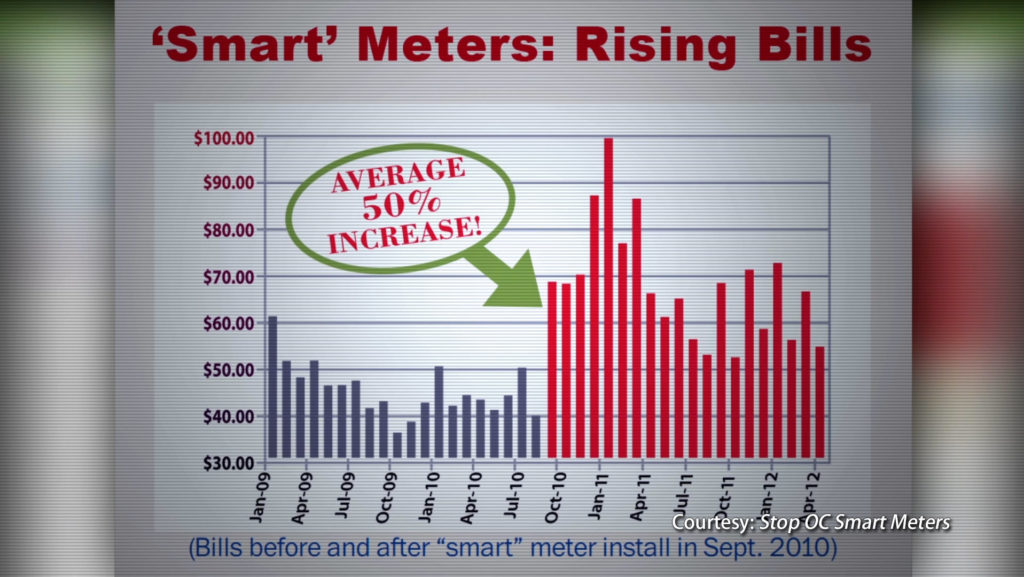 By B.N. Frank
By B.N. Frank
American opposition to utility “Smart” Meters – electric, gas, and water (see 1, 2) – has been ongoing since utility companies first started installing them. Given all the problems now identified with them – fires, explosions, higher bills (see 1, 2), frequent replacement (see 1, 2, 3), serious cybersecurity risks (see 1, 2), and more – opposition to these meters has significantly increased in the U.S. and worldwide.
“Smart” Meters are NOT safe. They also DO NOT save meaningful amounts of energy. Because so many Americans have complained, some state legislators have already proposed bills that allow constituents to “opt out” of these meters. Some utilities have also been forced into offering “opt-outs.” Pennsylvania residents had to go to court to be given the right to refuse them. Utility companies and their proponents continue to boo-hoo all of this.
From Utility Dive:
UTILITIES: PECO: Billions of investment at risk with Pennsylvania court’s rejection of smart meter mandate
Dive Insight:
Smart meters are widely considered to be safe, but energy companies often make accommodations for customers who do not want RF exposure.
The Commonwealth Court concluded that a group of customers fighting to have the meters removed from their property had not proven they faced a health risk — but the court did accept arguments that state law doesn’t require them to take the meters.
“Most utilities have a way for customers to opt out of a smart meter and some charge them for the extra cost,” according to Jordan Nachbar, spokesperson for the Smart Electric Power Alliance. “During their smart meter rollouts, many utilities post studies to combat some of the misinformation.”
Arizona Public Service, Xcel Energy Minnesota, Orange and Rockland Utilities, Hawaiian Electric and others have devised systems to allow customers to decline the meters, according to a 2019 report by Navigant Research. The firm is now known as Guidehouse.
“Vocal customers have raised privacy and health concerns related to smart meters and their communications networks,” the report found, “and some regulators have mandated opt-out programs to placate those concerns.” The development of opt-out programs “has been addressed in a myriad of ways by electric utilities across the nation.”
“It’s typically a very small number of customers” that take advantage of the opt-out, according to Guidehouse Senior Research Analyst Michael Kelly. The number of customers is usually below 5%, he said in an email.
The attorney for PECO customers seeking to have their smart meters removed says the court’s decision is a “big win for people concerned about RF.”
Because “Smart” Meters are 2-way transmitting, they emit high levels of harmful electromagnetic radiation that can make people and animals sick (see 1, 2, 3, 4, 5, 6, 7).
Regardless tens of millions of “Smart” Meters have been installed and millions more are planned because they are PROFITABLE to utility companies. Unlike one-way transmitting analog meters, “Smart” Meters allow utilities to collect minute-by-minute customer usage data 24/7. Utilities collect and analyze this data so they can market more products and services to customers and/or sell data to 3rd parties. These meters also allow them to remotely turn off services as well as ration energy.
Documentary – Take Back Your Power – reveals more disgusting details. Those who continue to belittle “Smart” Meter opposition look more foolish every day.
Activist Post reports regularly about “Smart” Meters and other unsafe technology. For more information, visit our archives and the following websites:
- Coalition to Stop Smart Meters
- EMF Safety Network
- StopSmartMeters.org
- SmartMeterHarm
- Smart Grid Awareness
- Smart Meter News
- Take Back Your Power
- The People’s Initiative
Subscribe to Activist Post for truth, peace, and freedom news. Send resources to the front lines of peace and freedom HERE! Follow us on SoMee, HIVE, Parler, Flote, Minds, MeWe and Twitter.
Provide, Protect and Profit from what’s coming! Get a free issue of Counter Markets today.



Be the first to comment on "Some State Legislators Don’t Like “Smart” Meters Either"